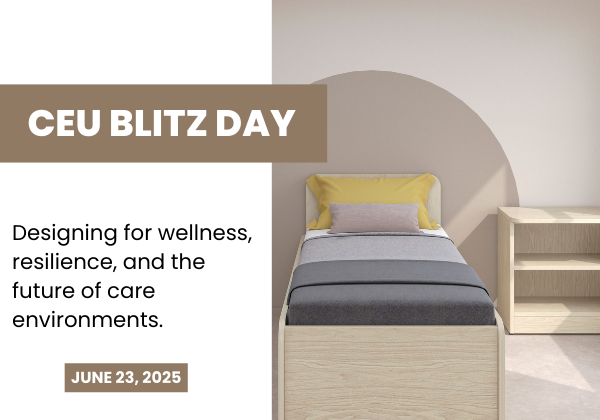
- Cet évènement est passé.
CEU Blitz at Group Lacasse Showroom
juin 23, 2025 @ 9:00 am - 7:00 pm EDT

June 23, 2025 | From 9 a.m. to 7 p.m.
Groupe Lacasse Showroom, Markham, ON
Join Groupe Lacasse for a full day of inspiring, accredited CEU sessions focused on designing for wellness, resilience, and the future of care environments. Hosted at the Groupe Lacasse Showroom, this drop-in event allows you to attend as many or as few sessions as your schedule allows.
Groupe Lacasse will be featuring four insightful CEU presentations by leading industry manufacturers:
 9-10.30 a.m. | Innovations in Resilient Flooring Solutions
9-10.30 a.m. | Innovations in Resilient Flooring Solutions
Presented by Lisa Parise from Matter + Co
Resilient Flooring: The future of resilient flooring is now–achieving performance beyond PVC are:
1. Define “PVC-free” flooring materials and discuss their health and safety benefits for building occupants.
2. Describe the significance of industry testing standards for flooring performance and gain familiarity with applicable ASTM (American Society for Testing and Materials) product specifications.
3. Specify PVC-free resilient flooring materials confidently, matching their attributes to commercial environments and projects that are pursuing green certification.
4. Utilize third-party sustainability tools to evaluate PVC-free resilient flooring materials.
 11 a.m. – 12 p.m. | Designing Environments for Dementia
11 a.m. – 12 p.m. | Designing Environments for Dementia
Presented by Julia Rosen from Groupe Lacasse
This course provides architects and interior designers with an in-depth understanding of how design can help improve the quality of life for individuals living with dementia. By focusing on practical design strategies such as color schemes, fabrics, patterns, art, and environmental cues, attendees will learn how to create safe, supportive, and stimulating spaces that foster well-being, reduce confusion, and enhance independence.
 1-2.30 p.m. | Behavioral Health Lighting Solutions
1-2.30 p.m. | Behavioral Health Lighting Solutions
Presented by Laurie Emery from Visa Lighting
Join us at Groupe Lacasse Inc – Toronto Showroom for an enlightening event focused on how Behavioral healthcare continues to evolve in our ever changing society. Treatment spaces for mental wellbeing are continually improving to provide safer and more therapeutic environments for patients and clinicians alike. Treatment objectives are moving beyond symptom control to patient centered recovery. Design choices should incorporate every element of the behavioral health facility design, including lighting and lighting control.
This course provides evidence based insights on behavioral healthcare within the context of the environment, an overview of behavioral health safety standards, examines considerations for lighting and luminaire design for behavioral health spaces, and illustrates successful behavioral health lighting applications relevant to patient centered care and current best practices.
Laurie is an experienced lighting designer with years dedicated to understanding how lighting design enhances the ambiance of the lighted environment and the well-being of its occupants. Her background in architecture and illumination science led her to a career in lighting design, where she discovered her true passion. This journey was enhanced by educational opportunities with the Illuminating Engineering Society (IES) and her attainment of her Lighting Certified (LC) credentials from the National Council on Qualifications for the Lighting Professions.
Laurie continues to utilize her professional lighting design experience at Visa Lighting through ongoing research into the application of modern lighting technology and design trends in the healthcare market. This expertise enables her to collaborate with design professionals to promote evidence-based design that fosters safety and healing in healthcare environments.
 3-4.30 p.m. | Aging Well in a Purpose-Built Environment
3-4.30 p.m. | Aging Well in a Purpose-Built Environment
Presented by Meghan McBride from Tarkett
Welcome to our exclusive event, with Meghan at Tarkett presenting Aging Well in a Purpose-Built Environment. Join us at the Groupe Lacasse Inc – Toronto Showroom for an exciting in-person experience.
This CEU explores how purpose-built environments can promote well-being and influence visual and sensory perception. An « age-friendly environment, » as defined by the World Health Organization, supports healthy, active aging by enhancing seniors’ capabilities throughout their lives. With the global population aging—1.5 billion people will be 65 or older by 2050—designing spaces that respond to predictable neurocognitive and sensory changes is crucial. These changes are especially impactful for those with conditions like Alzheimer’s and dementia. The built environment significantly influences functional independence and one’s sense of identity, both directly and indirectly.
Learning Objectives
· Research on cognitive aging, its stages, and the facts surrounding the dementia condition.
· Explore how emotional well-being later in life is associated with reduced independence, increased risk for dementia, and decreased ability to complete activities of daily living (ADLs).
· Examine cognitive health and environmental design interventions to reduce the increased risk to one’s physical safety as they age with dementia.
· Identify how interior finishes can support cognitive decline, visual acuity, mobility, and physical safety.
 5:00 p.m. – 7:00 p.m. | Designing for Dignity A Behavioral Healthcare Panel
5:00 p.m. – 7:00 p.m. | Designing for Dignity A Behavioral Healthcare Panel
Presented by Julia Hansen, Licensed Social Worker
Laurie Emrey, Visa Lighting
Behavioral Lighting Specialist
Exploring how lighting can influence mood, behaviors, and healing in behavioral environments.
Meghan McBride, Tarkett
Canadian Flooring Solutions Expert
Sharing how materials and finishes can meet code, aesthetic expectations, and maintenance needs in high-acuity spaces.
Shary Adams, Gensler Canada
Behavioral Healthcare Architect
Discussing cross-border design challenges and differences in public vs. private behavioral health models (U.S. vs. Canada).
Tracy (Parent Advocate)
Lived Experience Perspective
A moving story from a mother navigating the behavioral health system and the profound role design plays in care delivery.
Nurse (U.S.-based Behavioral Health Facility)
Insight into the youth behavioral health crisis in the U.S. and how environments of care impact treatment—contrasted with the Canadian system.
Plus: Exclusive Pre-Recorded Insights
Wayne Walker, PEI Mental Health
On redeveloping behavioral health infrastructure in Canada and lessons learned from facility expansion.
Ryan Searles, IMEG (Texas)
A deep dive into behavioral security design—how we can ensure safety without compromising dignity.
This panel is a must-attend for:
Designers, Architects, Healthcare Providers, Facility Planners, Behavioral Health Advocates, and Product Experts
Let’s move the conversation forward—toward compassionate, evidence-based spaces that respect the needs of every user.
Each session is accredited and offers practical knowledge and design strategies for creating safer, smarter, and more inclusive spaces. Secure your spot today!


